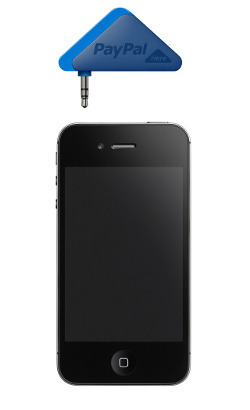The new PayPal Here smartphone-enabled credit card reader is the most recent indication of how electronic payments will likely change, ridding retailers of most industry compliance requirements, enabling simple payment processing solutions, and consolidating multiple or variable processing fees.
PayPal Here is a smartphone application and credit card reader — similar if not identical in concept to Square — aimed at helping small businesses accept and process payment cards from physical store locations.
“The new service,” according to PayPal’s official media release, “includes a free app and fully encrypted thumb-sized card reader, which turns any iPhone, and soon Android smartphone, into a mobile payment solution. With PayPal Here, small businesses, service providers, and casual sellers can send invoices or accept debit and credit cards, checks and PayPal using one simple product.”
The PayPal Here card reader attaches to an iPhone for card present transactions.
Payment Convergence
Although PayPal bills its Here service as “the world’s first global mobile payments solution that allows small businesses to accept almost any form of payment,” that description is, perhaps, puffery since there are at least a few similar services and since “almost any form of payment” is ambiguous. But PayPal Here is a recent indication that payment convergence is a real trend that could have a significant impact on how merchants and shoppers interact.
Removing PCI Responsibilities
The PayPal Here service — and similar solutions — will have to help merchants deal with Payment Card Industry (PCI) standards.
Without debating the merits of the PCI standards or whether or not they are fair to merchants, it is clear that for services like PayPal Here to be successful, those services will need to absorb most if not all of the PCI compliance requirements on behalf of sellers. If this were not the case, PayPal could hardly expect new Here customers selling widgets from mall kiosks and pushcarts — as some of the service’s promotional material suggests — to comply on their own.
What’s more, PayPal is offering Here as an extension, of sorts, of its online payment processing solutions, which already reduces the work a merchant must do to comply.
Competitive services like the aforementioned Square, or online payment services like Google Payments and Checkout by Amazon, also reduce a seller’s PCI requirements to nearly nothing. This trend should continue as more advanced payment solutions are released.
Consolidated or Lower Fees
PayPal Here charges a flat 2.7-percent fee on all transactions run through the service’s card reader and 3.5 percent plus 15 cents for card numbers typed into the application or scanned using the phone’s camera. Check processing is free. The company also promises that there will be no additional charges.
Similarly, Square presently charges a flat 2.75-percent fee for transactions it processes.
As competition increases in this smartphone payment processing space, it is reasonable to assume that some vendors will offer lower or more consolidated fees to gain a competitive advantage. In fact, one could argue that this is the very reason that PayPal Here launched with a slightly lower fee than the older Square service.
Easy of Integration
PayPal Here is banking on PayPal’s brand recognition to help attract customers.
“So, you’re asking, how is this different from other small business mobile payment solutions? The key differentiator is that it comes from PayPal, a trusted brand in the online payments industry with more than 100 million customers around the globe and years of proven payment innovation, driving growth for millions of businesses globally” wrote David Marcus, vice president and general manager of Mobile at PayPal in a blog post.
This close connection to between PayPal Here and, well, just plain PayPal may also indicate easy integration for sellers that have both an ecommerce store and a brick-and-mortar operation. It stands to reason that other competitive services will also make their mobile payment and ecommerce payment solutions work well together.
Competing Companies and Technologies
PayPal Here is not alone in new the new emerging mobile payment segment, and several competitors have already been mentioned, including Square.
Other competitors worth noting are Google Wallet, ISIS, Visa Wallet, Square Card Case, and Serve, which all use a technology called near-field communications to bypass physical payment calls altogether.
Services like Chase’s Person-to-Person Quick Pay, which transfers funds directly from a Chase checking account to a destination account, may also be a forerunner for business services that could make swiping cards obsolete.
Taken together, merchants should probably be optimistic about all of the new payment solutions becoming available. For the most part these companies and technologies should improve the payment industry, potentially making it easier for buyers and sellers to conduct business.




